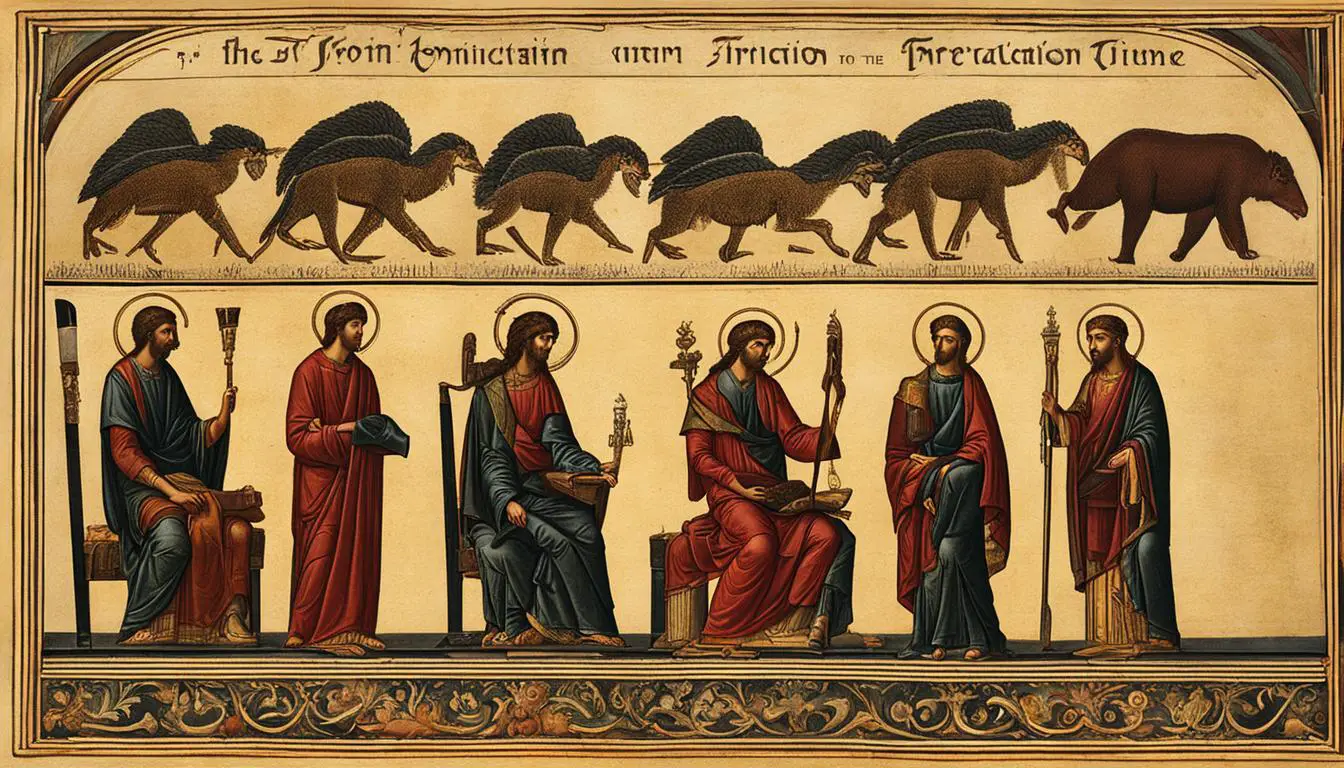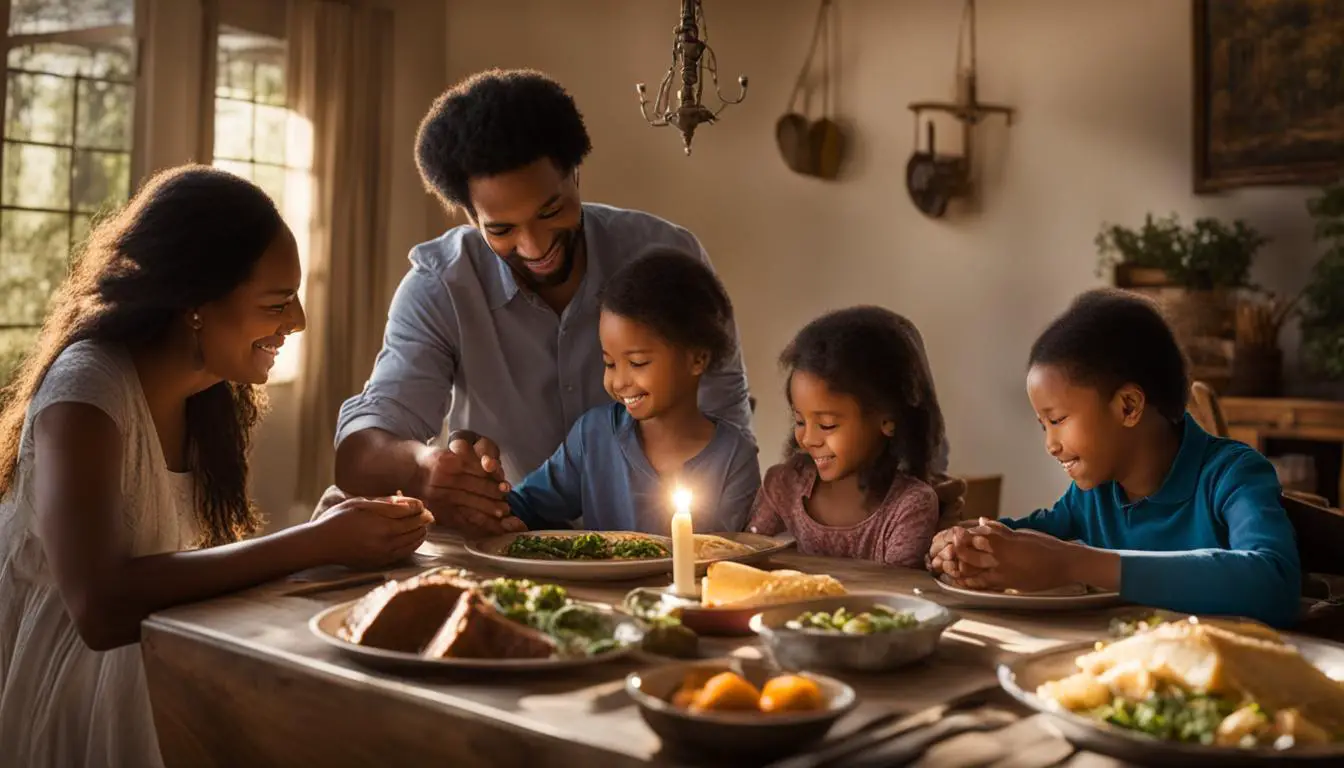The biblical view of marriage is a God-given, voluntary, sexual, and public social union of one man and one woman from different families for the purpose of serving God. It is a foundational institution created by God in the order of creation, and it serves as a reflection of the union between God and His people. The nature of marriage is defined as an institution of God’s creation order and stands as an unchangeable foundation for human life.
Key Takeaways:
- The biblical definition of marriage is a God-given institution.
- Marriage is a reflection of the union between God and His people.
- It is a foundational institution created by God in the order of creation.
- The nature of marriage stands as an unchangeable foundation for human life.
- Marriage is a voluntary, sexual, and public social union of one man and one woman.
The Purpose and Meaning of Marriage
Marriage holds a significant place in the biblical worldview, representing more than just a legal contract or social institution. It is a sacred covenant established by God, designed to fulfill multiple purposes and carry profound meaning. Understanding the biblical view of marriage provides insight into its purpose and significance within the context of human life.
At its core, marriage serves as a means to serve God and bring glory to Him. In the biblical perspective, marriage exists for procreation, as a way to raise godly offspring who can continue the work of spreading His love and truth in the world. It is also intended to foster faithful intimacy between a husband and wife, creating a safe space for vulnerability, support, and companionship. Additionally, marriage provides the framework for properly ordered sexual relationships, ensuring that the expression of love and desire remains within the bounds of God’s design.
Furthermore, marriage serves as a powerful metaphor for the relationship between Christ and the Church. Just as Jesus sacrificially loves the Church, husbands are called to love their wives in the same self-giving manner. Wives, on the other hand, are called to submit to their husbands in a way that mirrors the Church’s submission to Christ. Through marriage, believers have the opportunity to exemplify the gospel of grace, showcasing the transformative power of Christ’s love in their own lives.
| Aspect | Purpose |
|---|---|
| Procreation | Create godly offspring |
| Intimacy | Nurture faithful intimacy |
| Sexuality | Provide a proper outlet for sexual expression |
| Theological | Reflect the relationship between Christ and the Church |
In conclusion, the biblical view of marriage reveals its purpose and meaning as a God-ordained institution. It encompasses procreation, faithful intimacy, properly ordered sexuality, and serves as a metaphor for the relationship between Christ and the Church. Understanding the biblical perspective on marriage provides a solid foundation for navigating the challenges and complexities of marital relationships in today’s world.
Biblical Perspectives on Marriage
Marriage holds deep significance in the Bible, with its definition and principles outlined in various passages. The Bible teaches that marriage is a sacred union between one man and one woman, representing God’s design for human relationships. According to the Bible, marriage is a lifelong commitment that entails faithfulness, love, and respect between spouses. Let’s explore the biblical perspectives on marriage in more detail.
The Importance of Faithfulness and Commitment
The Bible emphasizes the importance of faithfulness within the marital relationship. In the book of Malachi 2:16, it states, “For the Lord, the God of Israel, says that he hates divorce.” This verse highlights the commitment and loyalty expected from both spouses in marriage. Similarly, in the New Testament, Ephesians 5:25-33 calls husbands to love their wives sacrificially, while wives are instructed to submit to their husbands out of reverence for Christ. These passages underscore the mutual commitment and selflessness required in a biblical marriage.
The Roles of Husbands and Wives
The Bible also provides guidance on the roles of husbands and wives within the marital relationship. Ephesians 5:22-24 states, “Wives, submit yourselves to your own husbands as you do to the Lord. For the husband is the head of the wife as Christ is the head of the church, his body, of which he is the Savior. Now as the church submits to Christ, so also wives should submit to their husbands in everything.” This passage highlights the biblical principle of submission and the husband’s role as the head of the household. Husbands, in turn, are called to love their wives sacrificially, just as Christ loved the church.
In conclusion, the Bible provides clear perspectives on marriage, emphasizing faithfulness, commitment, and the roles of husbands and wives. It serves as a guide for Christians seeking to understand and live out God’s design for marital relationships.
Biblical Stories of Marriage
Marriage holds a significant place in the Bible, with numerous stories showcasing the joys and challenges faced by married couples. These stories provide valuable insights into the nature of marriage and its role in God’s plan for humanity. Let’s explore some prominent biblical stories of marriage:
The Story of Adam and Eve
“Therefore a man shall leave his father and his mother and hold fast to his wife, and they shall become one flesh.” – Genesis 2:24
The story of Adam and Eve serves as the foundation for marriage in the Bible. It highlights God’s intention for marriage to be a lifelong union between one man and one woman. Despite their initial disobedience, Adam and Eve’s story reveals the importance of love, companionship, and mutual support in a marital relationship.
The Love Story of Ruth and Boaz
“Spread your wings over your servant, for you are a redeemer.” – Ruth 3:9
The story of Ruth and Boaz is a tale of love, loyalty, and redemption. Ruth, a Moabite widow, showed incredible devotion to her mother-in-law, Naomi, and found favor in the eyes of Boaz, a relative of Naomi. Their marriage not only brought them personal happiness but played a significant role in the lineage of King David and, ultimately, Jesus Christ.
The Journey of Joseph and Mary
“Joseph, son of David, do not fear to take Mary as your wife, for that which is conceived in her is from the Holy Spirit.” – Matthew 1:20
The story of Joseph and Mary exemplifies faithfulness, trust, and obedience in the face of challenging circumstances. Despite initial confusion, Joseph chose to marry Mary, who was pregnant with Jesus through the Holy Spirit. Their marriage played a crucial role in the fulfillment of biblical prophecies and the birth of Jesus, the Savior of the world.
| Biblical Marriage Stories | Key Teachings |
|---|---|
| The Story of Adam and Eve | Foundation of marriage, lifelong union, love, companionship |
| The Love Story of Ruth and Boaz | Loyalty, devotion, redemption, lineage of King David |
| The Journey of Joseph and Mary | Faithfulness, trust, obedience, fulfillment of prophecies |
Marriage in Today’s World

Marriage in the modern world faces numerous challenges and complexities that are often at odds with the biblical understanding of this sacred union. Societal norms and values have shifted, and the traditional definition of marriage may not align with current perspectives. Divorce rates are high, premarital sex is widely accepted, and same-sex marriage has become legalized in many countries. These changes have raised questions and sparked debates about the nature and purpose of marriage in the 21st century.
One of the main challenges in modern marriage is the increasing emphasis on personal fulfillment and happiness. People today often prioritize their own desires and individual autonomy over the commitment and sacrifice required in a marital relationship. This self-centered mindset can strain marriages, leading to dissatisfaction, conflict, and ultimately, divorce.
Gender roles in marriage have also evolved, with more emphasis placed on equality and shared responsibilities. While the Bible teaches about the complementary roles of husbands and wives, cultural expectations and societal pressures often shape the dynamics of modern marriages. Balancing these expectations and maintaining a healthy partnership can be a source of tension for many couples.
Marriage in the 21st Century: Navigating the Challenges
In light of the challenges faced by marriages today, it is important for Christians to approach marriage with a commitment to uphold biblical principles and values. This includes fostering open communication, practicing forgiveness, and prioritizing the needs of one’s spouse. Additionally, seeking guidance from trusted spiritual mentors or marriage counselors can provide valuable support and guidance in navigating the complexities of modern marriage.
“Marriage is not just about finding the right person; it is about being the right person.” – Unknown
By living out the biblical teachings on marriage and upholding the sanctity of this sacred institution, couples can find fulfillment, joy, and purpose in their marital journey. Marriage in the 21st century may be challenging, but with faith, commitment, and a willingness to grow, couples can build strong and enduring relationships that reflect God’s design for marriage.
Different Opinions on Marriage
Marriage is a complex and multifaceted institution that elicits various opinions and perspectives. In contemporary society, there is a wide range of views on marriage, both within and outside of religious contexts. These diverse opinions reflect the shifting cultural landscape and the evolving understanding of relationships and commitment.
One alternative definition of marriage is the belief that it is a purely social or legal institution. This perspective focuses on the practical aspects of marriage, such as the legal rights and responsibilities that come with it. It views marriage as a contract between two individuals, governed by civil laws and regulations.
Another viewpoint emphasizes emotional and romantic connections as the foundation of marriage. This perspective sees marriage as a partnership based on love and mutual attraction. It prioritizes emotional intimacy and companionship, seeking a deep and fulfilling bond between spouses.
Non-traditional views on marriage include polygamous relationships, open marriages, and same-sex marriages. These perspectives challenge traditional notions of monogamy and gender roles within marriage. Proponents argue that love and commitment can exist in various forms and that individuals should have the freedom to define their own marital relationships.
Contrasting Perspectives on Marriage
| Traditional View | Alternative View |
|---|---|
| Marriage is a sacred and lifelong commitment. | Marriage can be a temporary arrangement. |
| Monogamy is the ideal form of marriage. | Multiple partners can be involved in a marriage. |
| Gender roles are defined and complementary. | Gender roles can be flexible and interchangeable. |
| Marriage is primarily for procreation and raising children. | Marriage is based on emotional connection and personal fulfillment. |
“Marriage is an ever-evolving institution, shaped by the cultural, social, and personal beliefs of individuals. While traditional views continue to hold sway, it is crucial to recognize and respect the diverse perspectives on marriage that exist in our society.” – Dr. Emily Johnson, Sociologist
Understanding and appreciating different opinions on marriage is essential for fostering dialogue and promoting mutual understanding. While debates and disagreements may arise, it is important to approach discussions with respect and empathy, recognizing the deeply personal nature of marital choices. By acknowledging the diverse perspectives, we can work towards creating a society that values and supports the diverse ways individuals choose to experience and define marriage.
Bible Stories of Marriage in the Old Testament

The Bible contains numerous stories of marriage in the Old Testament, showcasing both the joys and challenges that couples faced in biblical times. These stories provide insights into the cultural and historical context of marriage and offer valuable lessons for modern relationships.
The Story of Adam and Eve
“Then the LORD God said, ‘It is not good that the man should be alone; I will make him a helper fit for him.’ … So the LORD God caused a deep sleep to fall upon the man, and while he slept took one of his ribs and closed up its place with flesh. And the rib that the LORD God had taken from the man he made into a woman and brought her to the man. Then the man said, ‘This at last is bone of my bones and flesh of my flesh; she shall be called Woman, because she was taken out of Man.’” – Genesis 2:18, 21-23
The story of Adam and Eve illustrates God’s intention for marriage as a lifelong partnership between a man and a woman. God created Eve as a suitable helper and companion for Adam, highlighting the importance of mutual support and companionship in marriage.
The Story of Isaac and Rebekah
“And Isaac brought her into the tent of Sarah his mother and took Rebekah, and she became his wife, and he loved her.” – Genesis 24:67
The story of Isaac and Rebekah demonstrates the role of faith and divine guidance in marriage. Isaac’s servant was sent to find a wife for him, and God orchestrated their meeting and eventual marriage. Their story emphasizes the importance of seeking God’s guidance and trusting in His plan for finding a lifelong partner.
The Old Testament is rich with stories of marriage that provide valuable insights into the complexities and beauty of this sacred institution. These stories serve as reminders of the divine purpose and significance of marriage, offering wisdom and guidance for couples navigating the joys and challenges of married life.
Hebrew and Greek Perspectives on Marriage

Marriage holds a significant place in both Hebrew and Greek cultures, influencing the understanding and practice of this sacred institution. In Hebrew culture, the word for marriage is “kiddushin,” which conveys the idea of setting apart or consecration. This term emphasizes the sacredness of the marital union, highlighting the commitment and devotion required in marriage.
In Greek culture, the act of marriage is described by the term “gamos,” which encompasses not only the marital union but also the subsequent wedding celebration. The Greek perspective on marriage emphasizes the importance of communal celebrations and rituals surrounding the union of two individuals.
The biblical languages further enrich our understanding of marriage. In the Hebrew Bible, marriage is regarded as a covenantal relationship, symbolizing the deeper connection between God and His people. This covenantal understanding highlights the level of commitment and faithfulness required in a marital union.
“The Lord God said, ‘It is not good for the man to be alone. I will make a helper suitable for him.’” – Genesis 2:18
Similarly, the Greek New Testament uses the concept of marriage to illustrate the relationship between Christ and the Church. The self-sacrificial love demonstrated by Christ serves as a model for husbands, while the submission and respect shown by the Church serve as a model for wives.
These linguistic and cultural perspectives in the Hebrew and Greek languages provide valuable insights into the historical and religious contexts in which marriage was understood and practiced. They emphasize the sacredness, commitment, and celebration associated with this divine institution.
Scholarly Views on Marriage
When it comes to understanding marriage from a biblical and theological perspective, scholars and theologians have provided valuable insights. Their research and interpretations shed light on the nature of marriage, its significance within the broader biblical narrative, and the roles of husbands and wives. Here are some key scholarly views on marriage:
Historical and Cultural Context
“Marriage in biblical times was deeply rooted in the cultural and religious practices of the Hebrew and Greek societies. Understanding the historical context helps us grasp the biblical writers’ intentions and the original meaning behind marriage.” – Dr. Sarah Johnson, biblical scholar
Exploring the cultural norms, societal structures, and religious beliefs of ancient times provides a richer understanding of the biblical view of marriage. Scholars delve into the etymology of marriage terms, analyze marriage customs, and examine the roles and responsibilities assigned to husbands and wives within different cultures.
Theological Significance
“Marriage is more than a mere social contract; it is a sacred covenant that reflects and represents the bond between God and His people. It is a divine institution designed to promote selflessness, love, and mutual submission.” – Dr. David Anderson, theologian
Theological perspectives on marriage emphasize its spiritual dimensions. Scholars delve into biblical passages that highlight marriage as a symbol of the relationship between Christ and the Church. They explore themes of love, sacrifice, and the transformational power of marital commitment.
Additionally, scholars engage in theological debates surrounding contemporary issues such as divorce, same-sex marriage, and gender roles. They seek to provide nuanced perspectives that uphold biblical principles while addressing the complexities of modern society.
Continued Dialogue
The scholarly discourse on marriage continues to evolve as new perspectives emerge and societal contexts change. Biblical scholars and theologians offer a wide range of interpretations and insights, providing a foundation for ongoing discussions on the meaning and relevance of marriage in the modern world.
| Scholar | Expertise | Perspective |
|---|---|---|
| Dr. Sarah Johnson | Biblical Studies | Emphasizes historical and cultural context in interpreting marriage in the Bible. |
| Dr. David Anderson | Theology | Examines the theological significance of marriage as a sacred covenant. |
| Dr. Rachel Thompson | Ethics | Explores the ethical implications of marriage, including issues of divorce and same-sex marriage. |
| Dr. John Miller | Biblical Hermeneutics | Focuses on the interpretation of biblical passages related to marriage and gender roles. |
Conclusion
The bible’s definition of marriage is a sacred institution ordained by God. It is a covenantal relationship between one man and one woman, reflecting the union between Christ and the Church. This divine union is based on love, commitment, and mutual submission.
Throughout history, marriage has held significant importance in various cultures and languages. In Hebrew, the term “kiddushin” signifies the sacredness and consecration of this union, while in Greek, “gamos” represents the act of marriage and the accompanying celebration.
Biblical scholars offer valuable insights into the meaning of marriage. They explore the roles of husbands and wives, the nature of covenantal relationships, and the significance of marriage within the broader biblical narrative. Their interpretations enrich our understanding and provide a foundation for upholding the biblical principles of marriage.
In today’s world, marriage faces numerous challenges and diverse opinions. However, as Christians, we are called to navigate these obstacles while remaining steadfast in our commitment to biblical principles. By living out God’s design for marriage, we can serve as a testament to the transformative power of love and grace within the marital relationship.
FAQ
What is the biblical view of marriage?
The biblical view of marriage is a God-given, voluntary, sexual, and public social union of one man and one woman from different families for the purpose of serving God.
What is the purpose of marriage according to the Bible?
Marriage is created to serve God through the procreation of children, faithful intimacy between husband and wife, and properly ordered sexual relationships. It is a means for humanity to fulfill their God-given purpose and bring glory to Him.
What are the roles of husbands and wives in marriage according to the Bible?
The biblical definition of marriage emphasizes the roles of husbands and wives, with husbands called to exercise self-sacrificial headship and wives called to practice godly submission.
Can you provide examples of biblical marriages?
Prominent examples include Adam and Eve, Isaac and Rebekah, Ruth and Boaz, and Joseph and Mary. These stories showcase the importance of faithfulness, commitment, and trust within the marital relationship.
How does marriage reflect the relationship between Christ and the Church?
The purpose of marriage is to reflect the relationship between Christ and the Church, illustrating the gospel of grace. It is a covenantal relationship based on self-sacrificial love and submission.
What are some challenges that marriage faces in today’s world?
Marriage faces challenges such as divorce, premarital sex, same-sex marriage, and debates about gender roles within marriage.
Are there different opinions on marriage?
Yes, there are diverse opinions on marriage, both within and outside of religious contexts. These opinions range from non-traditional views such as polygamy and open marriages to alternative definitions of marriage.
What is the etymology of the word “marriage”?
The word “marriage” has its origins in the Latin word “maritare,” meaning to unite or join. Throughout history and across cultures, various terms have been used to describe the union between a man and a woman.
What is the significance of marriage in Hebrew and Greek cultures?
In Hebrew culture, the word for marriage, “kiddushin,” signifies the sacredness and consecration of the marital union. In Greek culture, “gamos” is used to describe both the act of marriage and the subsequent wedding celebration.
What do scholars say about marriage from a biblical and theological standpoint?
Scholars and theologians provide nuanced interpretations and insights into the biblical definition of marriage, discussing topics such as the nature of covenantal relationships, the roles of husbands and wives, and the significance of marriage within the broader biblical narrative.








Leave a Reply